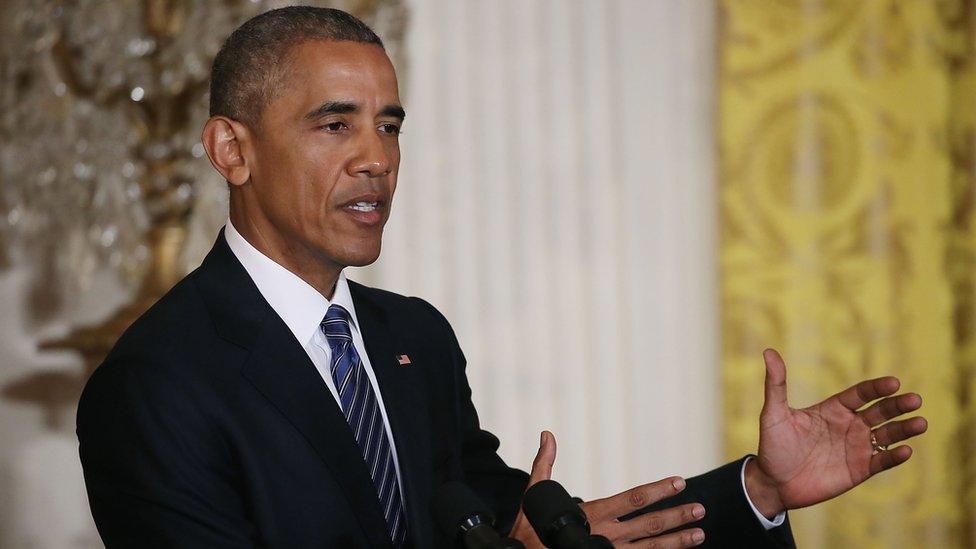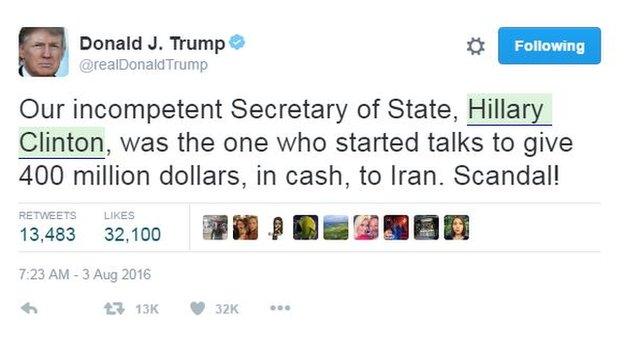White House: Iran cash payment not ransom for hostages
- Published

The White House has dismissed claims that the US paid a ransom to Iran in exchange for the release of five American prisoners.
The five prisoners were released in January in exchange for seven Iranians who were detained in the US for violating sanctions.
The exchange came as the US lifted international sanctions against Iran as part of the country's nuclear deal.
The US also airlifted $400m (£300.3m) worth of cash to Iran at the same time.
The Wall Street Journal reported , externalthat US officials sent an unmarked cargo plane loaded with Euros, Swiss francs and other currencies, suggesting that the payment may have been related to the release of five Americans, which included Washington Post reporter Jason Rezaian.
But White House Press Secretary Josh Earnest denied the link, saying the payment settled a longstanding dispute between the two countries from before the 1979 Islamic Revolution.
Mr Earnest said Republicans who oppose the landmark Iran nuclear deal have used the payment as a means of undermining the accord.
"They're struggling to justify their opposition to our engagement with Iran," he said at a White House press briefing.
Normalising relations
After the world's six major powers announced they would lift sanctions against Iran as a part of the implementation of the historic landmark deal, Tehran and Washington also agreed to settle a number of disputes between the two countries.
As Mr Earnest said in a press briefing on 19 January, the $400m (£300.3m) payment was "the result of a long-running claims process that had been at The Hague".
The then-Iranian government had purchased $400m (£300.3m) in US military equipment before it was overthrown in the 1979 Islamic Revolution.
The Obama administration had agreed to repay Tehran $1.7bn, which included the original payment as well as interest.
Cash payment on a cargo plane
Since Iran's financial institutions were completely cut off from the global electronic banking system at the time of the payment, it had to be made in cash.
The sanctions also meant it was illegal to make the payment in US dollars.
Republican presidential nominee Donald Trump took to Twitter to blame his Democratic opponent, former Secretary of State Hillary Clinton, for the payment.

Though Mrs Clinton is credited with initiating talks for Iran's nuclear deal, the accord was reached under current Secretary of State John Kerry.
Republican National Committee spokesman Reince Priebus also released a statement on the report.
"The Obama-Clinton foreign policy not only means cutting a dangerous nuclear deal with the world's number one state sponsor of terrorism, it also means paying them a secret ransom with cargo planes full of cash," the statement read.
State Department spokesman John Kirby responded to the claims on Wednesday, vehemently denying any link.
"As we've made clear, the negotiations over the settlement of an outstanding claim at the Hague Tribunal were completely separate from the discussions about returning our American citizens home," he said.
"Not only were the two negotiations separate, they were conducted by different teams on each side, including, in the case of the Hague claims, by technical experts involved in these negotiations for many years," Mr Kirby said.